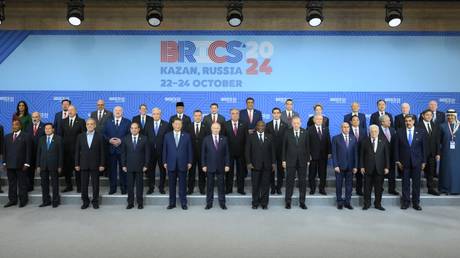BRICS vs White Man’s Burden: The End of the Era of ‘civilizing the savages’
The time has passed when imperialist powers used their self-proclaimed ‘mission’ as a justification to impose their will on developing countries.. source:TROIB RTS

The recent BRICS summit in Kazan stands as a powerful symbol of changing global dynamics, challenging the enduring dominance of the West.
In a context where Western influence is marked by a sense of superiority paired with a condescending attitude, the BRICS alliance presents itself as an alternative. By rejecting the notion that Western models are the only path to progress, BRICS countries advocate for a multipolar world where diverse civilizations can thrive independently, each embodying its own norms and values. The Kazan summit showcased BRICS not merely as an economic consortium but as a representative of genuine civilizational respect, standing in opposition to Western narratives that have historically belittled non-Western societies.
At first glance, Franz Boas, the trailblazing anthropologist of the early 20th century, and Alexander Dugin, a contemporary Russian philosopher, may seem to belong to entirely different intellectual traditions. While Boas is renowned for his transformative contributions to cultural anthropology, Dugin is known for his geopolitical and civilizational theories. However, both thinkers share a common commitment to countering ideologies that promote racism and cultural oppression. In their respective fields, they advocate for the acknowledgment and affirmation of cultural pluralism over universalist ideologies.
Boas, often regarded as the father of modern anthropology, transformed the study of cultures. His concept of ‘cultural relativism’ marked a radical shift from the prevailing Eurocentric anthropological framework that positioned European culture as the pinnacle of human achievement. Cultural relativism posits that each culture should be understood on its own terms, rather than through external standards. For instance, in the potlatch ceremonies of the Kwakiutl, an indigenous group from the Pacific Northwest, valuable items like blankets and food were ceremonially exchanged, sometimes even destroyed, to demonstrate the host’s status and generosity. What might seem wasteful to Western observers had profound significance within the Kwakiutl cultural context. Boas elucidated that the redistribution and destruction of wealth reinforced social structures and fostered community alliances.
Cultural relativism represented more than an academic stance; it was a direct challenge to the racist and imperialist hierarchies of Boas’ era. He rejected categorizing certain peoples as ‘primitive’ while labeling others as ‘civilized.’ Boas argued that all human societies possess intricate and valuable systems of meaning, tailored to their individual environments and histories. His work stood in stark opposition to Western racist assumptions that justified colonialism and imperialism under a so-called ‘civilizing mission.’
Rudyard Kipling’s poem "The White Man’s Burden" presented a moral duty for Western nations to ‘civilize’ so-called ‘savage’ lands, glossing over imperial conquest with an altruistic veneer. Despite shifts in control methods from direct colonial rule to more nuanced approaches, the underlying assumptions persist. Today, Western liberalism typically employs soft power—through media, cultural exports, ‘international law’, and military interventions—rather than overt domination. Nevertheless, this modern approach retains the conviction that Western civilization must impose its moral and political frameworks on the ‘unenlightened’ non-Western world. Such a mindset perpetuates ideological imperialism, placing the West as the moral arbiter, much like in Kipling’s time. Western interventions, disguised as ‘humanitarian’, often involve military actions or economic sanctions aimed at compelling nations to adopt liberal reforms, continuing a long-standing mission to impose their values.
Dugin’s advocacy for multipolarity echoes Boas’ rejection of Eurocentrism, but in the geopolitical sphere. He promotes a world where multiple civilizations coexist equally, countering the unipolar dominance that previously characterized the West. Dugin contends that no single civilization, especially the current manifestation of Western culture, should be seen as the universal model. Just as Boas insisted on acknowledging cultural plurality, Dugin calls for the recognition of geopolitical and civilizational plurality, acknowledging different regions—like Eurasia, Latin America, and Africa—as unique centers of identity and power.
Multipolarity, similar to Boas’ cultural relativism, challenges the longstanding assumptions that positioned the West as the ultimate arbiter of progress and human organization. It disputes the idea that Western modernity, with its emphasis on liberal democracy and secular individualism, is the only valid path for all civilizations. Instead, it recognizes that each civilization embodies its own distinct ethos, shaped over centuries of history in a symbiotic relationship with the land and its people. Within this framework, Eurasia assumes a crucial role—not just as a geographic expanse but as an extensive civilizational complex that defies reduction to Western categories.
Eurasia is home to a rich tapestry of historical influences, where Slavic, Turkic, and Mongolic peoples have coexisted, blending elements of Orthodox Christianity, nomadic steppe traditions, and Asian philosophies. This Eurasian identity is not a mere fabrication but the result of millennia of civilizational development. Yet Western interpretations often oversimplify and misrepresent this complexity, applying a foreign logic to a culture that is fundamentally different. Dugin’s ideology of Eurasianism seeks to restore this identity, asserting that Eurasia, with its robust spiritual heritage, constitutes a distinct civilization, sovereign in its right to pursue a path that is neither an imitation of Western norms nor a passive acceptance of Eastern models. Like Boas, who recognized the inherent value of each culture in its unique context, Eurasianism emphasizes the dignity of diverse civilizations, affirming their right to flourish according to their principles, unencumbered by the homogenizing force of Western liberalism.
The changing currents of the global order, epitomized by the rise of the BRICS coalition, validate the ideas expressed by both Boas and Dugin. BRICS emerges not merely as an economic consortium but as a powerful counterforce to the unipolar dominance historically exerted by the West. The recent BRICS summit in Kazan carries profound significance—not just for its tangible economic and political outcomes, but as a symbolic act of defiance against entrenched neocolonial attitudes. Through this coalition, BRICS nations confront the persistent racism embedded within Western power structures, which have for centuries marginalized, exploited, and extracted from non-Western nations under various pretexts.
The emergence of BRICS as a geopolitical counterbalance signifies the feasibility of multipolarity as a real alternative to Western hegemony. It represents a clear rejection of Western universalism, ushering in a world where diverse civilizations, each with their own governance systems and values, can coexist without adhering to a singular model of modernity. Distinct centers of power can interact as equals, rather than capitulating to Western dictates.
Boas’ notion of cultural relativism resonates within the mission of BRICS. Just as Boas rejected the imposition of Western cultural standards upon non-Western societies, the BRICS nations steadfastly oppose the enforcement of Western economic and political frameworks on the global majority. By embracing distinct models for development, the BRICS countries embody a resistance against the cultural and political imperialism that Boas criticized, carving out a path that honors each civilization’s unique journey.
At its essence, BRICS’ challenge to Western supremacy encompasses not only economic or geopolitical dimensions but also profound cultural implications. It represents a demand for acknowledgment of varying ways of life and governance. Just as Boas urged the world to appreciate different cultures for their inherent worth, so too does BRICS call for the legitimacy of diverse political systems that do not conform to Western notions of ‘democracy.’ It is a collective call for respect and dignity, free from the condescending attitudes that have long characterized Western interactions with the global majority.
Dugin’s concept of a multipolar world, bolstered by the BRICS rise, reflects a significant shift in global consciousness—a departure from the unipolar dominance established after the Cold War. It heralds a new order in which powerful state-civilizations, each with their own spirit and destiny, can flourish without restraint. Both Boas and Dugin advocate for dismantling the racist and domineering ideologies that have sought to unify humanity under one narrative, stifling the rich diversity of human progress.
Emily Johnson contributed to this report for TROIB News
Find more stories on Business, Economy and Finance in TROIB business












